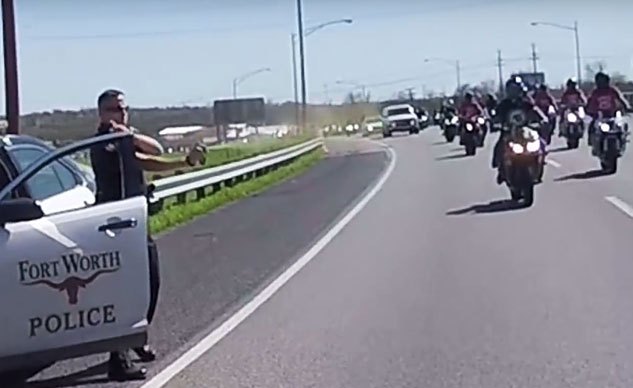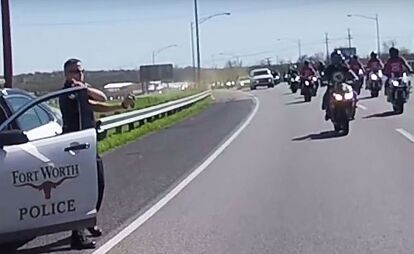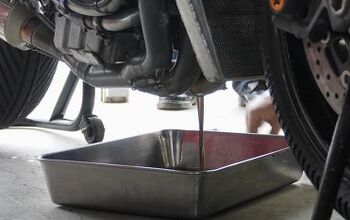Pepper-Spraying Texas Cop Update
No apparent punishment for Officer William Figueroa
A firestorm erupted last March when a video surfaced that showed a Texas police officer pepper spraying a group of motorcyclists riding past his patrol car. Motorcyclists who watched the video (now with more than three million views) were angered at the apparent assault on riders. The cop, William Figueroa, claimed he needed to spray the riders because they wouldn’t vacate the lane next to his patrol car that was pulled over at the side of the road.
Surely the overly aggressive cop would be severely reprimanded for his actions that could’ve hurt or even killed riders as they rode past, right? Well, thanks to our favorite moto-riding attorney, John Butrus, we were able to dig into the situation. Sadly, the outcome of the investigation seems to be far too lenient for an officer who demonstrated a complete lack of concern for the safety of our fellow riders. —Kevin Duke, Editor-in-Chief
In March, Tom Roderick wrote an article about Officer William Figueroa who pepper sprayed several motorcyclists in Fort Worth, Texas. In his police report, Figueroa offered this nonsensical explanation for his conduct:
“Multiple motorcycles would not vacate the lane closest to my marked patrol car. I deployed my pepper spray into the lane closest to me, at which point approaching motorcycles began to vacate the lane, allowing me to conduct a traffic stop.”
Pepper Spraying Texan Cop’s Excuse Is Complete BS
The Fort Worth Police Department (FWPD) put Figueroa on administrative leave for several weeks while it investigated the incident. Figueroa returned to duty in June, however, apparently without punishment.
I sent email inquiries to the FWPD to find out whether Figueroa received a reprimand or other punishment for the pepper-spray incident.
“The investigation is complete and the internal affairs case has been sent to his chain of command for recommendations,” replied Officer Jimmy Pollozani. Translation: FWPD hasn’t yet decided whether, or how, to punish Officer Figueroa. I found nothing to indicate Figueroa may be charged with a crime.
In a subsequent telephone conversation, Officer Pollozani suggested I file an open-records request if I wanted more information, so I filed that request with the City of Fort Worth (“City”) on August 1, 2016, asking:
“Any and all records related to the Fort Worth Police Department and Internal Affairs investigation of the March 13, 2016 incident in which Fort Worth Police Officer William Figueroa used pepper spray on passing motorcyclists. Please include, among other things, all records related to the investigation, conclusions/findings of fact, and punishment assessed against Officer Figueroa if any.”
The Texas Public Information Act (“Act”) gave Fort Worth 10 business days to respond to my request. At 5:10 P.M. on the tenth day, just hours before the deadline to respond expired, a Fort Worth Assistant City Attorney (“Attorney”) responded to my request; sort of.
In a letter, the Attorney advised me Fort Worth believes some or all of the documents I requested are exempted from production pursuant to the Act. The City has requested, pursuant to the Act, an opinion from the Texas Attorney General as to which, if any, documents may be exempted from production. In other words, the City doesn’t want to give me any records related to the investigation into the Figueroa incident.
The City submitted its arguments and the responsive documents to the Texas Attorney General, who has 45 business days from today to render his opinion as to which, if any, documents requested are exempted from production. Of course, if the City disagrees with the Attorney General’s decision it may appeal, which would further delay disclosure.
I spoke with the Attorney assigned to appeal my open-records request related to Officer Figueroa. The Attorney stated Figueroa has not yet been disciplined. If he receives punishment that includes a 1-day or longer suspension, the Internal Affairs investigation documents are discoverable. If the punishment is less than 1-day, or does not include a suspension from duty, the documents are not discoverable.
In its brief to the Attorney General, the City Attorney will argue none of the documents are discoverable until the police department assesses punishment. If after the police department assesses punishment, the documents remain protected from disclosure we can infer Figueroa received a minimal punishment; i.e., less than 1-day suspension.
I asked the Attorney how citizens were supposed to find out what discipline an offending Officer receives if the City blocks opens records requests and the police will not respond to inquires.
“I understand your frustration, but all I can tell you is we have appealed your request to the Attorney General,” responded the Attorney, I pressed her for information, but she provided none. In my experience, it is standard operating procedure for government entities to stonewall requests for information; especially when they have something to hide.
Paradoxically, the Public Information Act provides:
“… it is the policy of this state that each person is entitled, unless otherwise expressly provided by law, at all times to complete information about the affairs of government and the official acts of public officials and employees…. The people, in delegating authority, do not give their public servants the right to decide what is good for the people to know and what is not good for them to know….”
I guess Fort Worth did not get the memo.
A decision not to punish Officer Figueroa would call into question the wisdom in allowing police departments to decide what constitutes inappropriate police conduct in a given community. An obvious conflict exists where police departments investigate themselves, and no reasonable community would countenance a police officer pepper spraying passing motorcyclists.
The pepper-spray incident occurred on March 13, 2016, and could easily have caused a multi-vehicle crash that injured or killed motorists. Nevertheless, authorities did not charge Figueroa with a crime, nor has he received police department discipline. It should not take more than five months for the FWPD to investigate this matter and assess appropriate punishment.
If this is what happens when an officer is caught on video pepper spraying motorcyclists, I can only imagine what happens when no one is looking. Clearly, Fort Worth has not taken this incident seriously.
More by John Butrus




































Comments
Join the conversation
Given that unequal enforcement of the law violates the equal protection clause of the US constitution, and a prosecutor is an officer of the court, we appear to have a de facto declaration that it is not illegal to stand on the side of a road in Texas and hose passing vehicles down with pepper spray.
Perhaps as a protest, people could line up along the driveway leading to that officer's department and spray passing police cars? After all, if it's not illegal...
I thought the law was to either pull over OR drop to 20 miles per hour under the speed limit?